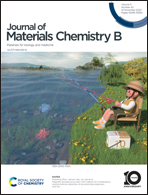Development and application of novel peptide-formulated nanoparticles for treatment of atopic dermatitis†
Abstract
Atopic dermatitis is a chronic inflammatory skin condition that is characterized by skin inflammation, itching, and redness. Although various treatments can alleviate symptoms, they often come with side effects, highlighting the need for new treatments. Here, we discovered a new peptide-based therapy using the intra-dermal delivery technology (IDDT) platform developed by Remedi Co., Ltd (REMEDI). The platform screens and identifies peptides derived from proteins in the human body that possess cell-penetrating peptide (CPP) properties. We screened over 1000-peptides and identified several derived from the Speckled protein (SP) family that have excellent CPP properties and have anti-inflammatory effects. We assessed these peptides for their potential as a treatment for atopic dermatitis. Among them, the RMSP1 peptide showed the most potent anti-inflammatory effects by inhibiting the nuclear factor kappa-light-chain-enhancer of activated B cells (NF-κB) and signal transducer and activator of transcription 3 (STAT3) signaling pathways while possessing CPP properties. To further improve efficacy and stability, we developed a palmitoylated version called Pal-RMSP1. Formulation studies using liposomes (Pal-RMSP1 LP) and micelles (Pal-RMSP1 DP) demonstrated improved anti-inflammatory effects in vitro and enhanced therapeutic effects in vivo. Our study indicates that nano-formulated Pal-RMSP1 could have the potential to become a new treatment option for atopic dermatitis.



 Please wait while we load your content...
Please wait while we load your content...